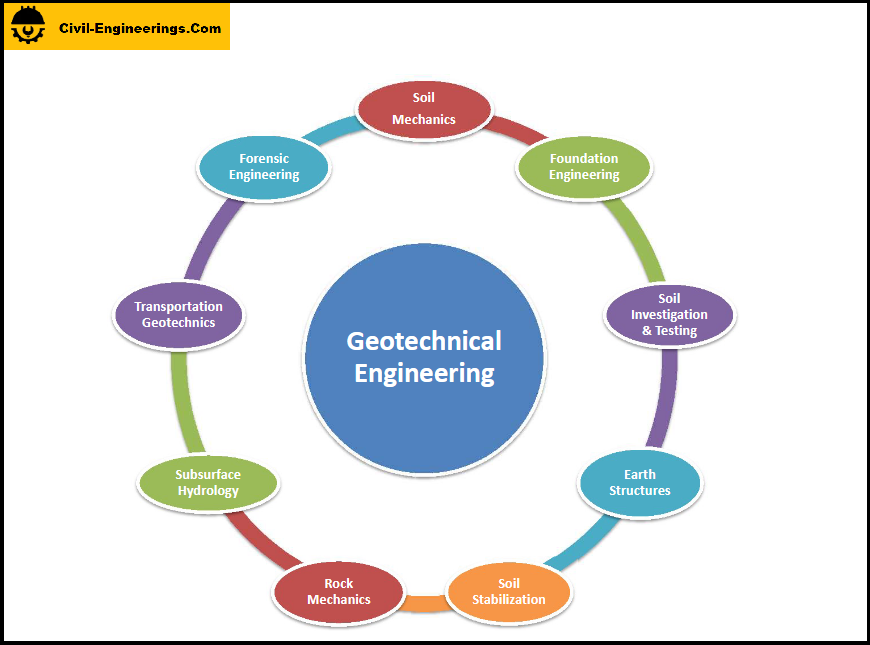All About Specialized Geotechnical Engineering Solutions
Table of ContentsWhat Does Specialized Geotechnical Engineering Solutions Mean?The Ultimate Guide To Specialized Geotechnical Engineering SolutionsWhat Does Specialized Geotechnical Engineering Solutions Mean?All About Specialized Geotechnical Engineering Solutions
They carry out site investigations, gather examples, perform laboratory tests, and evaluate information to evaluate the viability of the ground for construction tasks. Based upon their findings, geotechnical designers give suggestions for structure design, incline stability, keeping structures, and reduction of geotechnical threats. They collaborate with other professionals, such as architects, structural engineers, and building teams, to make sure that geotechnical considerations are integrated right into the general project design and execution.
Structure Style: Geotechnical designers play a crucial role in creating foundations that can securely sustain the designated framework. They analyze the dirt conditions and load needs to establish the appropriate structure type, such as superficial foundations (e.g., grounds), deep foundations (e.g., piles), or specialized strategies like soil renovation. They think about factors such as settlement restrictions, bearing capability, and soil-structure communication to establish optimum foundation designs.
A Biased View of Specialized Geotechnical Engineering Solutions
Below are some types of geotechnical designers: Foundation Engineer: Structure engineers focus on designing and examining foundations for frameworks - Specialized Geotechnical Engineering Solutions. They evaluate the dirt conditions, load demands, and site qualities to establish one of the most proper foundation type and style, such as superficial foundations, deep structures, or specialized strategies like heap foundations
They perform area testing, collect samples, and evaluate the collected data to define the dirt residential properties, geologic developments, and groundwater problems at a website. Geotechnical Instrumentation Engineer: Geotechnical instrumentation engineers concentrate on surveillance and measuring the actions of soil, rock, and structures. They set up and maintain instrumentation systems that keep track of variables such as soil settlement, groundwater levels, slope activities, and architectural variations to examine efficiency and provide early cautions of prospective concerns.
In the workplace setting, geotechnical designers utilize specialized software program tools to execute estimations, create designs, and analyze data. Specialized Geotechnical Engineering Solutions. They prepare reports, evaluation task requirements, connect with clients and group participants, and coordinate project activities. The workplace setting provides a conducive environment for research, analysis, and partnership with various other experts entailed in the job
They regularly see project websites to perform Read More Here site investigations, examine geotechnical problems, and collect information for evaluation. These visits involve taking a trip to various areas, in some cases in remote or difficult surfaces. Geotechnical designers might carry out soil sampling, conduct tests, and screen building and construction activities to ensure that the geotechnical elements of the project are being executed correctly.
Getting My Specialized Geotechnical Engineering Solutions To Work
Geotechnical designers also function in specialized geotechnical laboratories. Geotechnical research laboratory engineers work thoroughly in these environments, dealing with screening devices, operating tools, and taping information.
Preserving Walls: Producing wall surfaces that hold back dirt to avoid landslides and offer stability on sloped terrains. Embankments and Earthworks: Designing embankments for roadways, railways, and dams to guarantee they stay stable under stress and anxiety. The mining industry counts heavily on geotechnical design to ensure the safety and security and durability of its procedures.
With this in mind, we have actually made our program to prepare students for success. Geotechnical designers are entailed in all stages of the design of frameworks, from principle to building and construction. Their job is important in the design and preparation procedure as they examine the honesty of soil, clay, silt, sand, and rock, prior to building and construction beginning.
3 Easy Facts About Specialized Geotechnical Engineering Solutions Shown
This is followed by a ground examination based upon the searchings for of the desk study and involves trial pitting and sampling to uncover any possible concerns. Geotechnical designers function within multidisciplinary groups, sustained by intermediate and younger designers as well as by CAD service technicians. As a senior geotechnical engineer on a hydro plant project, jobs may consist of joining technological testimonials (e.g., peer evaluations), tailings dam evaluations, dam safety and security reviews, and various other researches associated to the style and construction of mine waste facilities.
While some experts specialise solely in geotechnics, others might work under titles like engineering rock hound or ground engineer within comparable abilities. As a geotechnical engineer, you'll need to: construct and preserve relationships with customers and various other professionals involved in the website, throughout each projectmaintain security standards on site bear in mind price ramifications when you make recommendationsstudy geological maps and aerial pictures from a series of resources and from different time periodsexamine building and construction prepares to see how viable they are based on your understanding of the siteinvestigate risks straight from the source or geological risks for the sitesearch for environmentally delicate features, such as land fill start to create factual and expository ground modelsplan field investigationsdrill and evaluate samples of bedrock, dirt, groundwater and additional products oversee various other professionals on sitesolve technological issues as they emerge, such as unanticipated structures at drill sitesmonitor problems during and after building and construction to make sure frameworks are stable in the brief and long termadd information accumulated on site to your first researchcreate geotechnical calculations, drawings, and two or three-dimensional computer versions interpreting the datamake suggestions about the recommended use the site.
There are great deals of opportunities to satisfy brand-new people, as you'll work with a series of professionals at every site. The job can be demanding as you may be in charge of the safety of others while on site. There is likewise a high degree of economic responsibility, as the suggestions you make can have significant cost ramifications.
